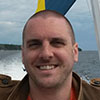Last week we went downtown for dinner and ran into someone we know. Zagreb, the capital city of Croatia, has over 700,000 people. We've only been here for three months. Despite those poor odds, we randomly bumped into our Airbnb landlady as she was on a family excursion with her sister and their children. When you travel full-time, running into someone you know, even slightly, is heartwarming because it's so rare.
In Puerto Vallarta, Mexico, our first destination as full-time nomads, I spied a familiar face one day at the Mercado. When I realized the face belonged to the lady at the lavandaria where we dropped off our clothes to be washed every week, I felt an irrational burst of happiness. I greeted her with a big smile and awkward Spanish, "Buenas dias!" She smiled, returned my greeting, and returned to filling her cart. But I rode a wave of excitement home and dashed up the concrete stairs to our Airbnb to relay this important news.
"Honey! I saw somebody we know at the Ley!"
As we flew into Zagreb this summer, I saw another familiar face: Tom Felton, who played Draco Malfoy in the Harry Potter movies. He stood out in the crowd, not because he was making a fuss or doing anything remarkable, but just due to sheer presence. His easy confidence and poised body language marked him even from a distance as "Somebody." However, it took me over an hour to figure out exactly who. After the flight, long past midnight, he appeared again, walking past us with his bag as we watched for our Uber in the lonely parking lot.
"You're Tom Felton, aren't you?" I asked.
"Who?" he replied, laughing, in his British accent. "I don't know who that is," he chuckled and kept walking. The following day, I read that a local cafe was hosting a Harry Potter-themed event, which seemed a likely explanation for his presence.
We're coming to the end of our 90 days in Zagreb. We will soon head back to the USA, where we speak the language and run into people we know everywhere. When we began our nomadic lifestyle, I thought returning to Tennessee for one month each year would be like returning from a very long vacation. I imagined dragging myself through the front door of my parents' home lugging suitcases of dirty laundry and collapsing on the sofa with a sigh of contentment. Home again at last!
That's not how it is, though. As the new becomes familiar, the once-familiar becomes new again. Slow travel is our life now, not a temporary break from our "real life" back in Tennessee. All the mundanities of life - washing clothes, buying groceries, going to the dentist - we did in Croatia, Morocco, Turkiye, and Portugal.
And in between the mundane, we get the sublime, like our recent trip to Plitvice National Park in Croatia. I had been eager to visit Plitvice Lakes since we arrived in Zagreb, and it fully lived up to all the praise it receives online.
Comprising over a hundred square miles of land centered on a network of lakes, streams, and waterfalls, Plitvice has been a popular tourist destination since the 19th century. The terrain varies from meadow-like expanses crisscrossed by streams and lakes to deep crevasses flanked by vertical rock faces and tumbling cataracts. Color-coded routes wind through the park, offering visitors strolls and hikes from three to eight hours. The price of admittance includes short bus and boat rides to help guests navigate the lakes and hills on their chosen route.
Plitvice is one of those dreamy landscapes that appear on your desktop as wallpaper, along with images of pristine snowy mountains and mossy green New Zealand forests. It's so beautiful it seems nearly unreal, like an idealized Earth that existed a million years ago but has now vanished amid the climate crisis and the proliferation of microplastics. And yet, Plitvice is a real place, just as beautiful as its photos.
Several things stood out during our explorations and now shine in my memories of Plitvice. First, the water in the lakes and streams is so clear. Crystal clear, like water transported to Croatia directly from a million years ago, before factories and combustion engines were ever dreamed of. Breath-taking blue and green water at the deepest points of the lakes thins into shallows where little fish and the occasional fallen tree trunk meet your gaze as if the depths of water between you are merely air.
Next, though you visit Plitvice, you don't actually touch Plitvice, even with the soles of your shoes. Instead, a network of raised wooden paths leads visitors through the entire park. Signs in Croatian and English warn visitors not to leave the boardwalks except in a few limited areas, like the lakeshore restaurant and along hilly trails. Until recently, summer visitors could swim in a designated lake bordered by waterfalls, but now the Plitvice ecosystem is relieved of our unintentionally damaging presence. Instead, we walk above the beautiful water, admiring it without contact.
Strolling through Plitvice and watching streams rush and gurgle beneath our feet, I was reminded of one of my favorite science fiction stories by Ray Bradbury. In A Sound of Thunder, a trophy hunter buys an expensive trip into the past to shoot a Tyrannosaurus Rex. The time-traveling safari company carefully minimizes interactions with the past to avoid changing the future in unpredictable and possibly disastrous ways. Safari guides lead hunters into the primeval forest along a levitating metal path and point them at specific dinosaur targets who are moments away from death by natural causes. The future is preserved.
As you might guess, the trophy hunter at the center of "A Sound of Thunder" blows it. Confronted by an enormous, terrifying Tyrannosaurus, the hunter panics and blunders off the metal path. Enraged, the safari guides grab him and return to the present only to find their worst fears realized. The present has been changed by the hunter's mistake. The wise statesman who had just been elected President before the safari has now lost that election. Instead, an aggressive megalomaniac was elected, a human Tyrannosaurus Rex. Horrified, the hunter searches for the cause of this change, and finds it embedded in the mud on his boot: a single, iridescent green butterfly. Tiny changes, multiplied over millennia, added up to disaster.
As we walked above and through Plitvice on the elevated boardwalks, the park's unspoiled beauty reverberating through our minds, I was glad we couldn't touch it. It was enough to be there, to see one of Mother Nature's most glorious faces, preserved by previous caretakers. We may never make it back to Plitvice since life is short and the world is big, but I'll enjoy running into its beautiful face in my memories for years to come. Having stayed on the path, I trust that Plitvice will remain unchanged in the future so others can enjoy it, too.
 Julie
Julie


















